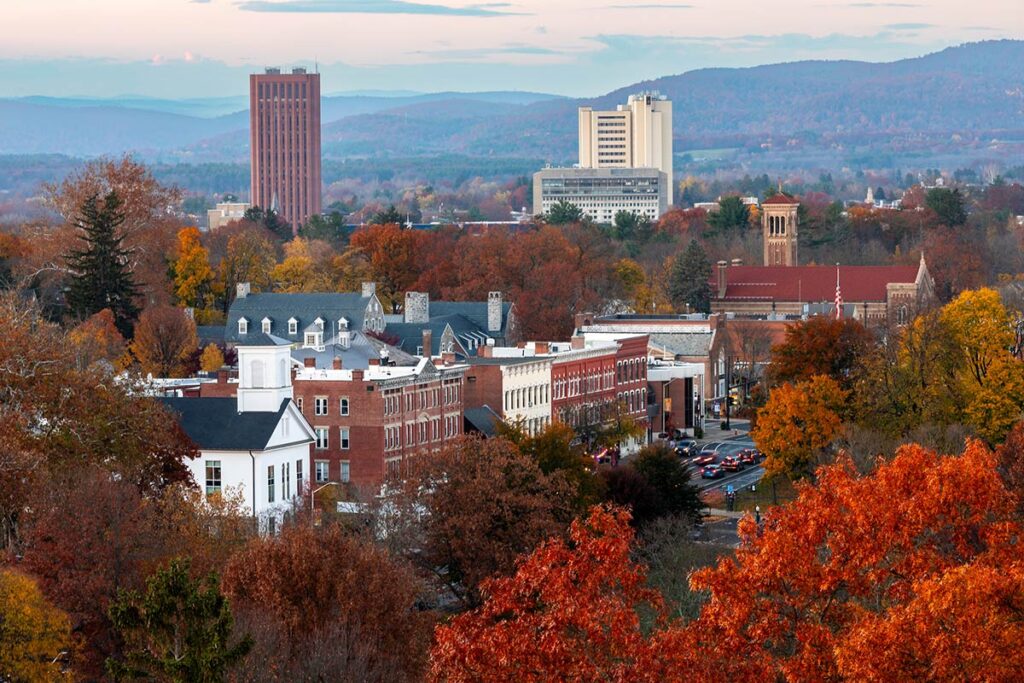Opinion: The UMass Connection to Amherst Town Government. When Is It a Conflict of Interest?

Photo: amherst.edu

One of the top reasons for changing to a Town Council form of government was to solve the town’s most pressing problem – where to house the additional students UMass has admitted without providing housing. UMass is a major player in town, but frequently has interests that are at odds with those of year round residents. For example, UMass wants to house those excess students downtown in huge dorm-like buildings. And they want zoning changes that would house more of them in your neighborhood.
Thus the question arises: Should UMass staff, or former UMass staff (or staff of any major institution in town for that matter) be eligible to serve on the Amherst Town Council? Does it matter how long they have been employed by UMass, or whether they were employed at the highest levels of management, or, if retired, how long they have been retired? When is there a conflict of interest or an apparent conflict of interest?
Lynn Greisemer has been Town Council President since the inception of the Council five years ago. However, she is listed on the UMass website as a current Senior Advisor at the Donahue Institute, the ”public service, outreach, and economic development unit of the University of Massachusetts President’s Office”. As President of the Council, she regularly attends the Town Manager’s high level meetings with UMass administrators, and does not report back to anyone- not even to the rest of the Council – on the content of those meetings.
The UMass website states that Griesemer served for 31 years with the Donahue Institute, starting in 1987. During that time, she served as the Associate Vice President for Economic Development at the UMass President’s Office for 25 years and Executive Director of the Institute for 19 years. After the formation of the University’s five-campus system in 1991, she worked closely with the UMass President’s Office, managing several system-wide projects in economic development and related areas.
Greisemer married Bryan Harvey in 1993. Harvey was similarly involved at the highest levels of UMass management. As of 2020, Harvey had more than three decades of experience integrating strategic and facilities planning in higher education, most recently as the Associate Chancellor and Chief Planning Officer at the University of Massachusetts Amherst.
Bryan Harvey was Chair of the Select Board in 1994, when the first of the recent attempts was made to change our form of government to a hybrid model including a downsized Town Meeting, a Town Council, a Mayor and a Manager, which failed.
Harvey was the Chair of the Charter Commission from 2001-2003 and was a strong supporter of changing the form of government. That commission proposed a Town Council/Mayor/Manager form of government, which again failed.
In 2005, there was a citizen petition for a Charter revote and another vote for the change of government, which also failed.
In the following years, the town formed two groups to address town-university topics, and in particular where to house students. First formed was the Town Gown Steering Committee in 2013 charged with coming up with an economic development and housing plan, which was followed by a more extensive group, the University, Town of Amherst Collaborative (UTAC) in 2015. UTAC did not last beyond the formation of the new government in 2018. In fact, there has been no transparent working group involving the university or colleges and residents since then.
In 2014, a consultant group, the U3 Advisors, submitted a final report to the Town Gown Steering Committee regarding how to house students within the town. (And see one response to that proposal from members of the town-gown steering committee.)
Finally, in 2016, another Charter Commission was impaneled with Andy Churchill as Chair and strong supporter of changing the form of government. Andy Churchill is a former Assistant Director at the Center for Education Policy at University of Massachusetts Amherst. In 2013, he was appointed to serve on the Town Gown Steering Committee. He later also served on the University, Town of Amherst Collaborative (UTAC), which had been proposed by the town-gown steering committee.
The 2016-2017 Charter Commission changed course from previous Charter Commission recommendations. It proposed moving from the formerly recommended model of Town Council/Mayor/Manager to a Council/Manager form, which allows for much less public input and participation, since a Manager is not elected. There is much less basis for a balance of power and much more ability to “steamroll” an agenda with a Council/Manager form.
UMass was the consultant to the most recent Charter Commission and to the previous Charter Commissions.
As a “company town”, Amherst needs to be doing a better job looking for conflicts of interest in both the council and on appointed committees. Certain folks, with apparent conflicts of interest should be ineligible to serve. In other cases, there are good reasons for recusal from decision-making which is rarely done by this council. No one appears to be looking out for the residents’ interests when conflicts arise.
At present, UMass could not have a more loyal soldier running the council than Lynn Griesemer. She should be ineligible to serve based on her current position at UMass.
Correction: An earlier version of this column reported that Councilor Ana Devlin-Gauthier joins the Town Manager and Council president at high-level meetings with UMass administrators. Devlin-Gauthier reports that she has only attended one such meeting. We have removed reference to her attendance from the article.
Darcy DuMont is a former town councilor and sponsor of the legislation creating the Amherst Energy and Climate Action Committee. She is a founding member of Zero Waste Amherst, Local Energy Advocates of Western MA, and the Amherst Climate Justice Alliance and a non-voting member of Valley Green Energy Working Group. She can be contacted at dumint140@gmail.com.

Darcy asks an important and complicated question. In Amherst many residents will have positions at one our colleges. And it is not only at the colleges that questions of conflict of interest may arise’; developers, landlords, business people are among others who might have a potential conflict of interest.
The position of President of the Town Council is a special case, though. She (or he) is in a position to meet privately and repeatedly with other powerful people in the town and she sets the agenda for the Town Council. It is a special position of great power and that power may not always be exercised in public. It is not sufficient for the Council President to recuse herself from particular votes or to announce publicly that her position presents a potential conflict she will guard against. Those actions might be sufficient for the other twelve Coouncil members but not for the President.
But in a town like ours we clearly cannot prevent any legal voter from running for a
Council seat, nor could we prevent councilors from nominating and electing any one of their number to be President of the Council.
What we could do is amend the Charter so as to prohibit any councillor from serving more than one of the two terms in any session, so no councillor would serve as President for two consecutive years. Each new council organizes itself, as the third Town Council is doing tonight as I write (Tuesday). That would be a reasonable accommodation, I think, and would not single out any individual based upon their position or work.
Lynn Griesemer has been President of the Council for two terms, in this case five years rather than the normal four. I understand that tonight her name will be advanced for a third term but that she may have some opposition. This comment is probably too late to affect action tonight, but I would encourage the new council, as it considers changes to the Charter (which currently can happen once every ten years) to consider term limits for its own officers. I personally would go further than that, just as I would for our Federal House and Senate, but I would be pleased at this more modest step to prevent the concentration of power.
Umass is a big employer . Most candidates in Amherst, may have some connection to Umass.
This relationship has been present in town forever .
Thank you Darcy.
Just as a note, to be elected a councilor of any kind I don’t believe you have to have a very large percentage of the votes when considering all eligible voters in Amherst.
Pop Quiz
=======
Imagine three hypothetical Amherst residents: A, B, and C.
A is a member of the UMass faculty.
B prepares food in one of the UMass dining commons.
C is not a UMass employee, but rents rooms to UMass students in a house near campus.
Which of A, B, and C has the greatest conflict of interest on most matters before the Amherst Council? Which has the least? (Explain your reasoning!)
I, for one, would like to thank Lynn Griesemer for her many years of service to the Town of Amherst. Ditto for Bryan Harvey. It’s a thankless job to serve on any committee in this town and an opinion piece denigrating their efforts is one of the reasons why. Term limits and any other changes to the Charter are fair game. But I don’t believe one should cast aspersions and question the motives of someone who has served tirelessly. I welcome the involvement of those who work at UMass and think our town is the better for it.
John, conflict of interest can range from blatant to subtle or even subconscious. Could your gratitude toward UMass be colored by past contract work you have done for the university?
The fact is that not everyone benefits from the decisions town leaders are making, regardless of how hard they are working. It is in the interest of good government to understand why.
There were candidates in a recent election who adopted Mr. Lee’s and Mr. Greenebaum’s arguments about the concentration of power in town, and they lost. Let the attempts at persuasion continue. But until we have election seasons that feature genuinely spontaneous public engagement between candidates, and between candidates and the public, we are missing something in our political culture, that no charter reform, however imagined, can fix. What we have is boring and stilted which avoids broader discussions about the future of the Town. Until some change occurs, we all remain in our silos.
Thank you for writing this piece Darcy. You raise incredibly important points. These are serious conflicts of interest. Lynn should have been ineligible all along, and certainly should not receive a third term.
@ Richard Morse, something we agree on — political discourse has not improved since the days of Town Meeting. The Council form of government was promoted as heralding much greater citizen involvement and engagement. I have yet to see it.
Lynn Greisemer is a District Councilor, elected by a very small percentage of Amherst voters, yet she has ruled the Council in the office of Council President going on 6 years. The Charter Commission debated whether both District and At-Large councilors should be eligible to be Council President and decided that all should be able to serve. They apparently didn’t foresee the current situation. I believe District Councilors should either be ineligible for the office or all should have term limits. I would opt to let all serve as President but for term limits of two years. Then all could share the opportunity and power consolidation by one councilor would be prevented.